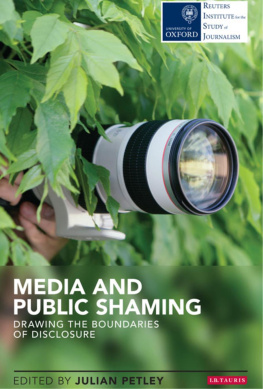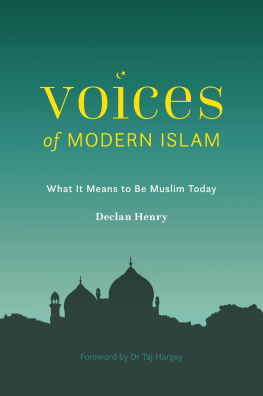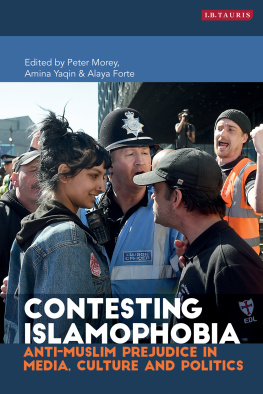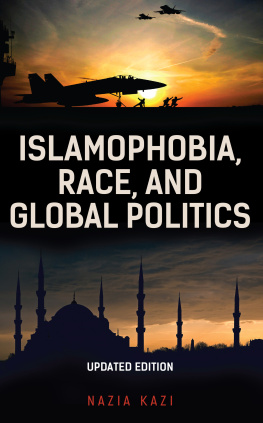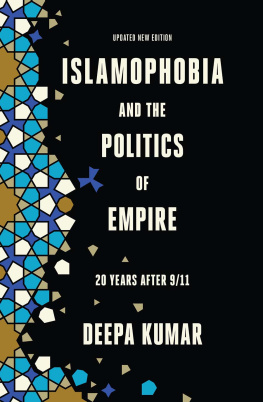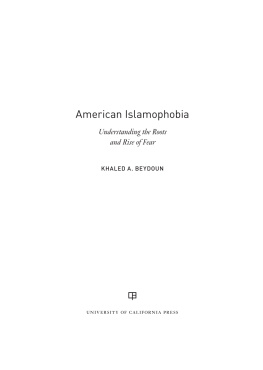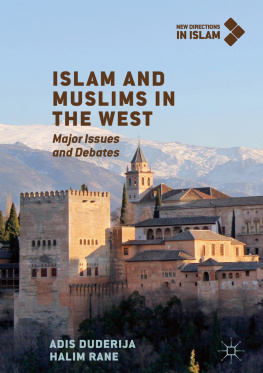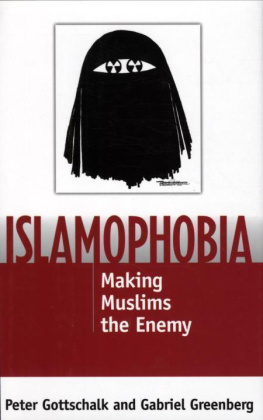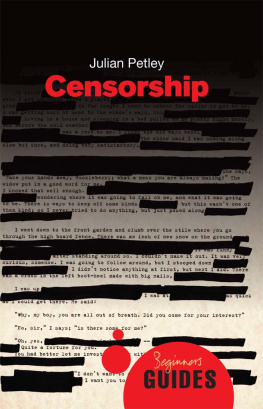Pointing the Finger
Pointing the Finger
Islam and Muslims in the British Media
Julian Petley and Robin Richardson

A Oneworld Paperback Original
Published by Oneworld Publications 2011
This ebook edition published in 2013
Copyright Julian Petley and Robin Richardson 2011
The right of Julian Petley and Robin Richardson to be identified as
the Authors of this work has been asserted by them in accordance with
the Copyright, Designs and Patents Act 1988
All rights reserved
Copyright under Berne Convention
A CIP record for this title is available
from the British Library
ISBN 9781851688128 (Paperback)
ISBN 9781851688135 (Hardback)
eISBN 9781780744636
Typeset by Glyph International
Cover design by vaguelymemorable.com
Front cover cartoon Andrzej Krauze / Guardian News & Media Ltd 2006
Oneworld Publications
10 Bloomsbury Road
London WC1B 3SR
England
Stay up to date with the latest books,
special offers, and exclusive content from
Oneworld with our monthly newsletter
Sign up on our website
www.oneworld-publications.com
Contents
Julian Petley and Robin Richardson
Robin Richardson
Robin Richardson
Justin Lewis, Paul Mason and Kerry Moore
Hugh Muir, Julian Petley and Laura Smith
Julian Petley
Robin Richardson
Gholam Khiabany and Milly Williamson
Claire George
Hugh Muir and Laura Smith
Julian Petley and Robin Richardson
Contributors to Pointing the Finger
Claire George received her PhD from Durham University in 2005 and completed an MA in Journalism at Brunel University in 2008. She is an active Anglican whose work strongly supports building greater understanding between different faiths.
Justin Lewis is Head of the School of Journalism, Media and Cultural Studies at Cardiff University. He joined Cardiff in 2000, having worked for twelve years in the United States at the University of Massachusetts. He has written numerous books about the media, culture and politics, including Constructing Public Opinion (2001) and Citizens or Consumers: What the media tell us about political participation (2005).
Paul Mason is a Senior Lecturer in the School of Journalism, Media and Cultural Studies at Cardiff University. He has written extensively in the field of law, crime and media. He is co-author of Nine Years of UK Anti-Terrorism Legislation: an audit of civil liberties (2010), which was written for the legal research group Adduce, and Images of Islam, which accompanied a Channel Four Dispatches programme (2007). He is currently training as a barrister.
Kerry Moore is a Lecturer in Journalism in the School of Journalism, Media and Cultural Studies at Cardiff University, and co-editor of Migrations and the Media (forthcoming). Her research interests focus on exploring racism in political and media discourse, and she has recently completed her PhD, which examines discourses of asylum under New Labour.
Hugh Muir is a journalist at the Guardian and the author of numerous articles on the issues of race, racism and Islamophobia. He was responsible with, Laura Smith, for the interviews and research underlying Islamophobia: issues, challenges and action (2004).
Julian Petley is Professor of Screen Media and Journalism in the School of Arts at Brunel University, chair of the Campaign for Press and Broadcasting Freedom and a member of the board of Index on Censorship. His most recent books are Censorship: a beginners guide (2009) and the co-authored Television News, Politics and Young People: generation disconnected? (2010).
Robin Richardson is a director of the Insted educational consultancy. His previous roles include director of the Runnymede Trust and chief inspector of education in the London borough of Brent. He acted as consultant and editor for the Commission on the Future of Multi-Ethnic Britain chaired by Lord Parekh (1998-2000), wrote Islamophobia: a challenge for us all (1997), and edited Islamophobia: issues, challenges and action (2004).
Laura Smith is a journalist, writer and communications consultant who has written for the Guardian, Independent and the London Evening Standard. She was shortlisted for a Race in the Media award in 2001 and was responsible, with Hugh Muir, for the interviews and research underlying Islamophobia: issues, challenges and action (2004).
Introduction
Julian Petley and Robin Richardson
I n his book Only Half of Me: being a Muslim in Britain (2006), journalist Rageh Omaar recalls a brief episode he witnessed on a London bus. It was a cold and dark afternoon, the kind of winters day when it seems the sun has struggled to rise at all. He was sitting on the lower deck and suddenly became aware of eight teenage schoolgirls clattering and tumbling down from the top deck, shouting to each other and talking loudly on their mobile phones. They were full of gaiety and laughter and were from a range of backgrounds. Some were of Somali heritage. Omaar writes:
The Somali girls switched back and forth, in and out, from a thick London accent to Somali. One of them turned to her white friend and screeched: Those bacon crisps are disgusting! Just keep that minging smell away from me girl, I tell ya! and then fell about laughing. They discussed each others clothes and another girl in their class, then one of the Somali girls shouted, Bisinka! did you really say that? In one breath she went from a Somali Muslim word, Bisinka, which means By Gods mercy or With Gods help, and which Somalis say when something shocking happens, to English. None of her friends, black, white or Muslim, batted an eyelid.
()
The vignette evokes a multicultural society at ease with itself. Elsewhere in his book, however, Omaar is well aware of conflicts and problems. He is not starry-eyed references to 7 July and 21 July 2005 run through his book with grim frequency. But he also takes pains to accentuate common ground and shared interests, the aspects of modern city life that are ordinary, positive and hopeful. Amid vivid reminders of linguistic, religious, cultural and ethnic differences and interactions, none of the school students he saw on the bus was in any way fazed none batted an eyelid. Cultural differences can be threatening and can cause deep discomfort and anxiety for Muslims, Omaar stresses, as well as for everyone else. But that is not the whole story. It is possible to realise, he says, that our worlds are not in conflict.
Implicitly throughout, and from time to time directly, Omaar attends to the texts, talk and imagery through which relations between Muslims and non-Muslims are represented and not represented in the British media. Being a journalist himself he knows well the practical context in which journalists work: commercial competition between papers and between channels; the bottom lines of ratings and circulation figures; the relentless pressure of deadlines; the political expectations and requirements of proprietors and editors; the pressure to entertain, simplify and please rather than to inform, challenge and educate; the inevitability of inaccuracy and distortion even with the best will in the world; the continual emphasis on immediacy, sensation, novelty, human interest. Despite his personal knowledge of the daily pressures under which journalists work, Omaar believes the media could do a better job. In effect, though not in so many words, he proposes that the following questions about the media should be asked:


